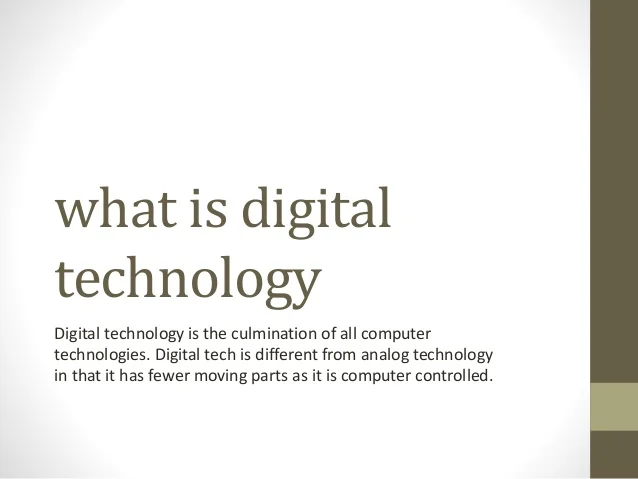You’ve probably heard the term “digital technology” thrown around a lot, but what does it actually mean? In this article, we’ll break down the definition of digital technology and explore how it can be used in various industries.
What is digital technology?
Table of Contents
Digital technology is a type of technology that uses digital data to perform various operations. It is a broad field that includes a wide range of subfields and specialties, such as computer science, information technology, electronic engineering, and more.
The use of digital technology has revolutionized many industries and sectors, including communication, entertainment, education, healthcare, transportation, and more. It has also had a profound impact on our everyday lives, changing the way we work, play, and communicate.
Digital technology is constantly evolving, and it is important to stay up-to-date on the latest developments in order to stay ahead of the curve. There are many great resources available online to help you learn about digital technology and keep up with the latest trends.
What are the benefits of digital technology?
Digital technology has revolutionized the way we live, work, and communicate. It has made our lives easier and more efficient in many ways. Here are some of the benefits of digital technology:
1. Increased productivity and efficiency: Digital technology has made us more productive by automating repetitive tasks and providing us with instant access to information.
2. Improved communication: We can now communicate with anyone in the world instantly and easily through email, social media, and video chat.
3. Greater convenience: We can now purchase goods and services online without having to leave our homes. We can also access entertainment and news on demand.
4. Enhanced security: Digital technology has made it possible to encrypt data and communication, making it more secure from hackers and criminals.
5. Improved access to education and information: With the internet, we now have access to virtually limitless amounts of information and education at our fingertips. This has enhanced our ability to learn and grow as individuals.

What are the risks associated with digital technology?
There are a number of risks associated with digital technology. One of the most significant risks is data breaches. This can occur when information is stored insecurely, or when there is unauthorized access to systems. This can lead to the loss of confidential data, and can also have other consequences such as identity theft.
Another risk is system failures. This can happen when systems are not properly maintained, or when they are overloaded. This can lead to data loss, and can also cause disruptions to businesses and services.
Finally, there is also the risk that digital technology will become obsolete. This can happen when new technologies are developed that make existing ones redundant. This can lead to wasted investment, and can also mean that businesses and individuals are left behind.
How can you mitigate the risks of digital technology?
As digital technology becomes more and more prevalent in our lives, it’s important to be aware of the risks that come along with it. Fortunately, there are a few things you can do to mitigate these risks:
1. Keep your software and operating systems up to date.
2. Use strong passwords and two-factor authentication whenever possible.
3. Be careful about what personal information you share online.
4. Be cautious about clicking on links or opening attachments from unknown senders.
5. Use security features like firewalls and antivirus software to protect your devices and data.
By following these simple steps, you can help keep yourself and your data safe from the potential dangers of digital technology.
How has digital technology changed the way we live and work?
Digital technology has revolutionized the way we live and work. It has made communication and collaboration easier and more efficient and has given us access to a wealth of information at our fingertips. It has also changed the way we shop, entertain ourselves, and stay connected with friends and family.
Digital technology has had a profound impact on our economy. It has created new industries and empowered businesses of all sizes to compete in the global marketplace. It has also had a transformative effect on our workforce, making it possible for people to work from anywhere in the world.
Despite its many benefits, digital technology also poses some risks. It can be used to invade our privacy, spread misinformation, and engage in criminal activity. As we become increasingly reliant on digital devices and systems, it is important to be aware of these risks and take steps to protect ourselves from them.
What are the advantages and disadvantages of digital technology?
Digital technology has revolutionized the way we live, work, and communicate. It has made our lives more convenient and efficient. However, like any new technology, it also has its drawbacks. Let’s take a look at some of the advantages and disadvantages of digital technology.
Advantages:
1. Increased productivity: With digital technology, we can do more in less time. For example, we can use computers to create documents, do research, and stay connected with co-workers and clients.
2. More options and flexibility: Digital technology gives us more choices and options than ever before. We can choose from a variety of online courses, work from home, and communicate with people from all over the world.
3. Greater convenience: Digital technology is more convenient than traditional methods. For instance, we can shop online, book tickets, and bank from the comfort of our homes.
4. 24/7 access: Thanks to digital technology, we now have 24/7 access to information and services. This means we can work or study at any time of day or night.
5. Increased security: Digital technology has made our lives more secure by storing important data electronically and providing us with access to secure networks
What does the future of digital technology hold?
Digital technology is changing the way we live, work, and communicate. It’s hard to predict what the future will bring, but there are some emerging trends that suggest where digital technology is headed.
One trend is the increasing use of artificial intelligence (AI). Machines are becoming more and more adept at completing tasks that traditionally required human intelligence, such as understanding natural language and recognizing patterns. AI is being used in a variety of applications, from self-driving cars to digital assistants like Siri and Alexa.
Another trend is the proliferation of connected devices, known as the “Internet of Things” (IoT). More and more everyday objects are being equipped with sensors and connectivity, allowing them to share data and be controlled remotely. This trend is being driven by the falling cost of sensors and computing power, as well as the need for better data to improve efficiency in our homes and workplaces.
Finally, we’re seeing a shift from traditional forms of communication to digital ones. Email and social media have replaced face-to-face interactions in many cases, and messaging apps are becoming increasingly popular. This trend is being accelerated by the rise of mobile devices like smartphones and tablets.
Digital technology is evolving rapidly, and it’s
Conclusion
As you can see, digital technology is becoming increasingly important in our lives. By understanding what digital technology is and how it works, we can better take advantage of its benefits and avoid its potential pitfalls. Do you have any questions about digital technology? Let us know in the comments below!






More Stories
How To Install Lg Tv On Android Devices
Do You Know The Best Software To Protect Your Privacy?
Exploring the Power of TotallyScience GitLab: A Comprehensive Review